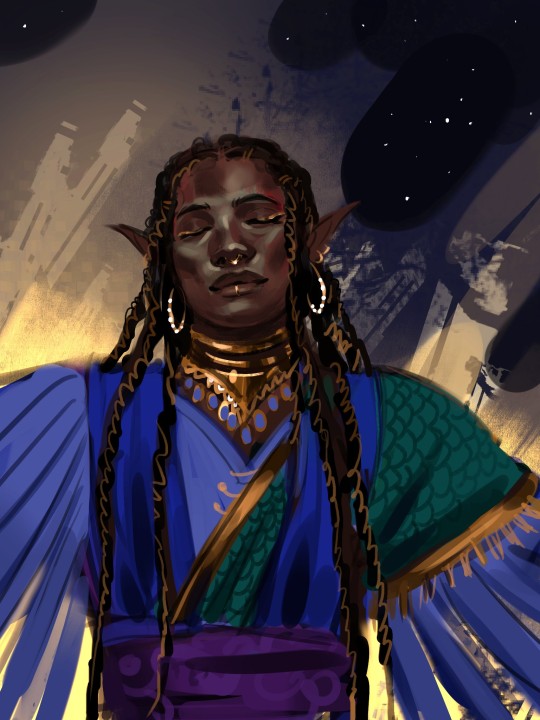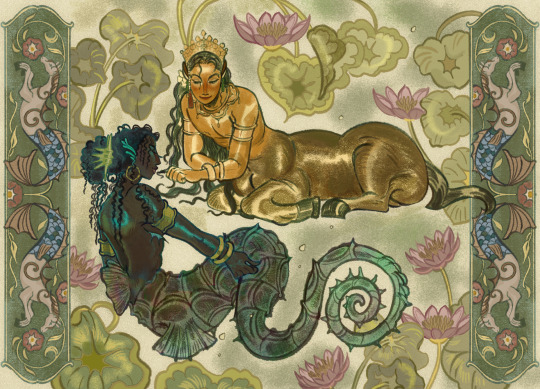Don't wanna be here? Send us removal request.
Text

House of Fingolfin Group Photoshoot at Katsucon 2026
"Utúlie'n aurë! The day has come!"
Silmarillion cosplayers and fans are invited to join us for a special group photoshoot at Katsucon 2026 featuring the House of Fingolfin, the most valiant and noble house of Finwë. Bring your favorite Nolofinwëan cosplay and your battle flags, and let's stand proudly together! Descendants, spouses, OCs, and duplicate characters are welcome! You can even bring a closet cosplay if you'd like. Please share widely so we can have an amazing meetup 🏹
Katsucon 2026 is located at the Gaylord National Resort and Convention Center, National Harbor, Maryland. The dates are February 13-15.
Characters available to select (more can be added upon request): Finwë, Indis, Fingolfin, Anairë, Fingon, Aredhel, Turgon, Argon, Elenwë, Idril, Maeglin, Eöl, Tuor, Eärendil, Elwing, Elrond, Elros, Gil-galad
Artwork by @windrelyn, used with permission. Do not repost or use for AI training.
21 notes
·
View notes
Text








These are some of the photos I took for @silmarillionwritersguild's Mereth Aderthad. A few more will eventually be posted on the SWG site. The top three are from the North Beach gathering on Friday evening; the remaining are from the library portion of the event.
If you have more event photos to share, please reblog and add them!
27 notes
·
View notes
Text
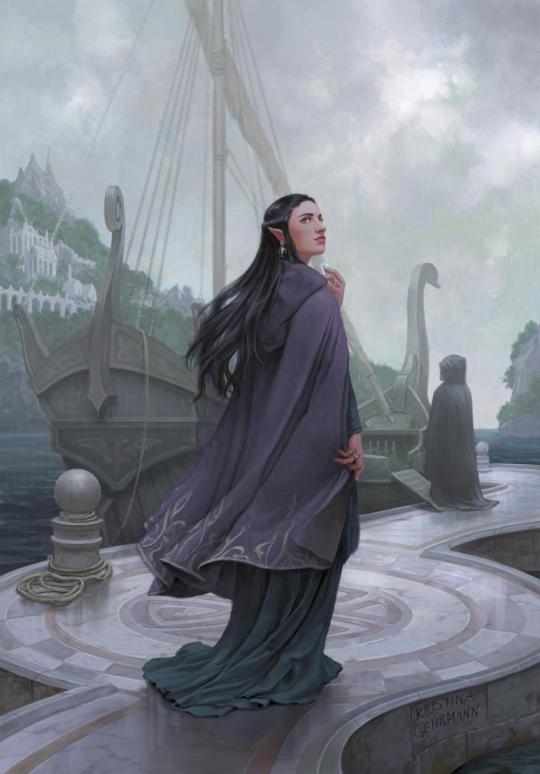

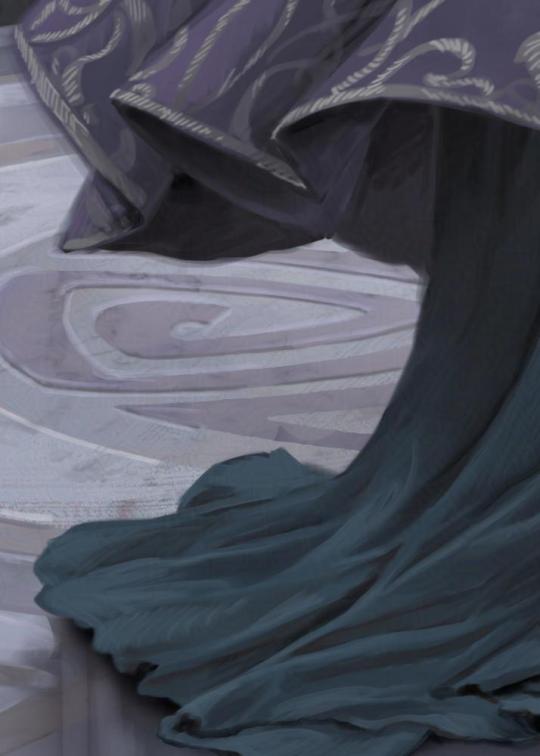
New LotR fanart! Arwen. :) Or, fun with muted, melancholy color palettes. Medium: Photoshop & Wacom Intuos 4.
Prints: https://www.inprnt.com/gallery/kgehrmann/arwen/
378 notes
·
View notes
Link
A Sliver of Light Left Over
(96238 words)
By: Peasantswhy
Chapters: 23/23
Fandom: TOLKIEN J. R. R. - Works & Related Fandoms, The Lord of the Rings - J. R. R. Tolkien, The Silmarillion and other histories of Middle-Earth - J. R. R. Tolkien
Rating: Explicit
Warnings: Creator Chose Not To Use Archive Warnings
Relationships: Ereinion Gil-galad/Erestor, Elrond Peredhel/Celebrían, Glorfindel/Rog
Characters: Ereinion Gil-Galad, Erestor, Elrond Peredhel, Glorfindel, Tar-Elendil, Celebrían, Elladan, elrohir, Arwen Undómiel, Lindir, Rog, OFC
Additional Tags: War, Grief, Recovery, Hope
Summary:
Erestor arrives in Mithlond on the eve of the Last Alliance.
I’m delighted to present this to y’all! What started out as a simple character experiment quickly ballooned into something much, much more interesting. I hope y’all have as much fun reading it as I did writing it!
20 notes
·
View notes
Text
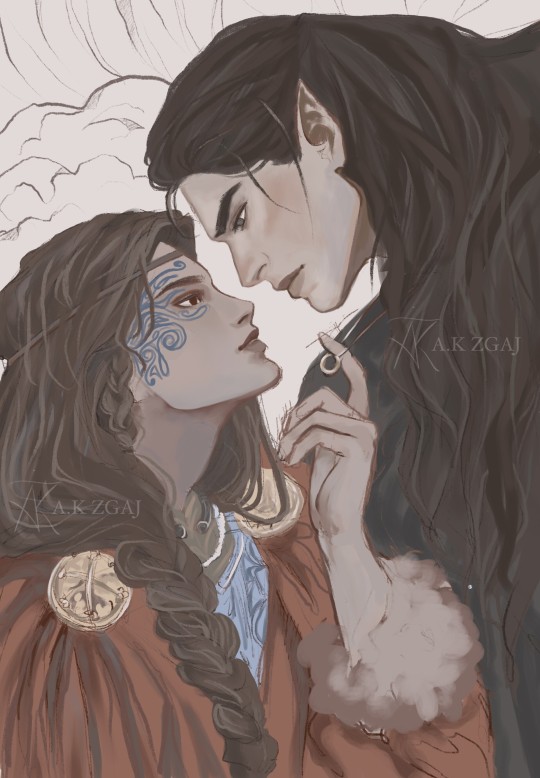
”come closer, Elf Lord," she said.
”dont’t try me, Haleth,” he replied.
” i already did it."
982 notes
·
View notes
Text

Feanor | Feanaro
Steel eyes and a backbone to match
162 notes
·
View notes
Text
thinking about the parallels between théoden and denethor, and i have a LOT of thoughts about them. about how they are the same and how they differ, and why this reflects the redemption of one and the final destruction of the other. and how that reflects the wider themes of the story. and why i feel it is deeply unfair to accuse théoden of being a bad parent on a remotely comparable level to denethor. and duty and power and love and and and
but i think the biggest thing for me is. swords.
both characters' arcs are explicitly connected to their relationships with swords, but in opposite ways.
théoden's is unarmed for the majority of his illness/corruption. his redemption is symbolised by him standing and calling for his sword. his sword has been lacking from him in the depth of his corruption, and he has accordingly separated himself from the responsibility it represents. he ceases to be warrior or king or father, and becomes an invalid; and when he is cured he can have his sword back.
denethor, on the other hand, carries a sword constantly. he dresses in mail he will not use with a weapon he will not raise, explicitly to show his readiness for an attack that he absolutely proves he is not ready for. he adopts the appearance of duty without its meaning. he thinks he is a warrior, a king, and a father because he performs the actions of those roles, but he does so without understanding them or having the motivating force behind them. he cannot be redeemed because he thinks he already has been, that he has no need to restore anything because he is already everything he should be.
compare and contrast their children's lines: éowyn's "those without swords can still die upon them" and faramir's "i do not love the sword for its brightness [...] i love only that which [it] defends." these lines, and the relationships between the child and the father(-figure), are microcosms of the relationship between people and lord.
éowyn, who is kept from taking up the sword - who wants to take up the sword, to assert agency and because she understands that the war is coming whether she is in it or not - understands that théoden is not protecting anyone by denying the presence of the threat. under wormtongue's influence, théoden denies that there is a threat, believes that anyone sounding the alarm is doing so maliciously and that the best thing to do is to maintain the status quo, close the doors, and avoid the inevitable. his redemption is in taking up the sword - and as king, as the representative of rohan, the whole of rohan takes up the sword when he does - and meeting the truth. those without swords can still die upon them.
théoden does not, in my estimation, prevent éowyn from taking up arms because he disregards her, underestimates her, or doesn't care about her. i would argue that both he and éomer want her to remain out of it because they love her - because they want to protect her, but fail to recognise as she does that it is not protecting her to remove her agency and ability to contribute actively to the war. the war must be fought, and won, for her as much as for anyone: éowyn's arc, rohan's arc, and théoden's arc is all in "those without swords can still die upon them." you cannot protect people by refusing to acknowledge the threat, no matter how lovingly it is done: you have to let them take up the sword.
faramir, on the other hand, is faced with the exact counterpoint of that. denethor is not trying to protect anyone. denethor is entirely about political image: his own self-image, and how others perceive him. denethor knows that there is an existential threat, and where he denies anything, it's the hope of peace or victory. but he is also entirely concerned with the act of defence. he will continue to throw troops into the meat-grinder while still holding out, inherently, for his own heroism and the belief that only he can save Gondor, that the deaths of thousands are just a way to buy time for his personal psychic battle with sauron. the palantír is not what corrupts him, it is the tool that justifies his corruption. denethor does not value the running of his city or his country, he will not help rohan or call rohan for help without outside intervention, he demands to be the main character of this war. in the end, he is prepared to desecrate everything that gondor holds dear - the tombs of the stewards, the continuation of his line, the idea of the king - and to abandon his defence of the walls to follow his own grief and anger. because it was never about defence. it was about being sharp and pragmatic and cold and steely. he never cared about people, because the people in his life have only ever been tools to him.
and so he ignores the advice of his people - in this case represented by faramir and imrahil - and the knowledge that he is throwing lives away for no real tactical advantage. he sends faramir out, and faramir goes - not because faramir believes it, or because faramir is spineless, but because everyone is aware that if faramir doesn't go then someone else will - and everything goes terribly wrong. and now denethor decides that he should spare some lives, and not let imrahil lead a sortie outside the walls to rescue them. why? because it doesn't matter to him. it matters to him only when he realises that losing faramir means that he has lost his legacy. and he is now ready to despair, because there is no more battle, there is no more mind war with sauron, there is no more sword to raise, there is only "that which they defend". and denethor doesn't give a shit about what he's defending. he cares about the idea of defending. in the end, he abandons his sword in favour of a knife and a torch - tools without glory - because the sword without the values behind it is meaningless.
and that's why théoden can be redeemed, and denethor can't. because théoden maintains the driving principles, but loses the strength. denethor has the strength, but he has never truly had the principle. and principle without strength is weakness, but strength without principle is death.
ALSO DENETHOR IS A 1:1 SYMBOLIC REPRESENTATION OF BUTCHER OF THE SOMME FIELD COMMANDER SIR DOUGLAS HAIG IN THIS ESSAY I WILL....
47 notes
·
View notes
Text
From the article:
New research from Colorado State University and Cornell University shows that the presence of solar panels in Colorado’s grasslands may reduce water stress, improve soil moisture levels and — particularly during dry years — increase plant growth by about 20% or more compared to open fields.
One of the biggest downsides to renewable energy sources is that they usually take up more physical space--and therefore more habitat--than fossil fuels. However, there is increasing evidence that combining solar panels with certain food crops or types of habitat can actually be beneficial to both!
This study is particularly heartening because it implies that solar panels may help certain ecosystems weather the increased droughts brought on by climate change.
584 notes
·
View notes
Text
Meriadoc and the Halfling's Leaf
I have previously posted about Meriadoc Brandybuck and the Horn of Eorl. I have also posted about pipe-weed, and the crazy Saruman back-up plan to fund his evil wizard lifestyle by becoming the weed czar of Middle-earth. But although Merry adored horns, his first love, last love, and all love in-between, was reserved for pipe-weed.
Merry doesn't just love pipe-weed, he becomes the foremost scholar in Middle-earth about pipe-weed. His book was so widely regarded by the denizens of Middle-earth that it shows up as a spoiler in the introduction to Fellowship of the Ring. But how did he go from local expert to world-wide published author?
This is the subject of today's deep dive.
1
The beginning is the end. JRRT spoils the entirety of Merry's character arc by being unable to stop himself from mentioning Merry's canonical work about pipe-weed in THE ACTUAL INTRODUCTION to FOTR.
This means that when Merry blacks out somewhere on Pelennor Fields, readers might pause and think, "Wait, Meriadoc, wasn't he -- alive at the end of this because he published a book?" That's not the reader's fault, it's JRRT's for spoiling the plot. JRRT makes it very clear that Merry lives, becomes Master of Buckland, and writes the definitive book of lore about pipe-weed:
All that could be discovered about [pipe-weed] in antiquity was put together by Meriadoc Brandybuck (later Master of Buckland), and since he and the tobacco of the Southfarthing play a part in the history that follows, his remarks in the introduction to his Herblore of the Shire may be quoted.
There follows THREE LONG AND LOVING PARAGRAPHS ABOUT PIPE WEED, purported to be written by Merry himself. How did this get into the introductory part of the Red Book of Westmarch? Good question, but probably via Sam, amending Frodo's introduction before he himself sailed into the west -- or from Elanor Fairbairn, who inherited the book after Sam.
Anyway, we now know why Master Meriadoc Brandybuck, Nazgul's Bane, Knight of the Riddermark, and member of the King's Council of Arnor, is actually famous: it's for his deep and abiding love of weed.
2
Merry's relationship with pipe-weed and with Théoden grows at the same time. Although Merry enjoys pipe-weed, he doesn't reveal his enthusiasm for it until he encounters Théoden for the first time. Merry seems like an ordinary user of the weed, along with his fellow Hobbits, until a chance conversation with Théoden reveals the depth of his knowledge. His very first conversation with King Théoden, upon meeting him outside the broken gates of Isengard, is:
‘For one thing,’ said Théoden, ‘I had not heard that they spouted smoke from their mouths.’
‘That is not surprising,’ answered Merry; ‘for it is an art which we have not practised for more than a few generations. It was Tobold Hornblower, of Longbottom in the Southfarthing, who first grew the true pipe-weed in his gardens, about the year 1070 according to our reckoning. How old Toby came by the plant…’
And then Gandalf rudely interrupts, or we would have had the entire treatise from the introduction then and there.
3
When King Théoden dies, he tells Merry that he will lament not listening to Merry's herb-lore. This nearly functions as a deathbed geas, and feels like it might be the inciting incident for Merry's later impulse to write about herb-lore and tobacco:
The old king smiled. ‘Grieve not! It is forgiven. Great heart will not be denied. Live now in blessedness; and when you sit in peace with your pipe, think of me! For never now shall I sit with you in Meduseld, as I promised, or listen to your herb-lore.’
Merry is initially unable to fulfil this request because of his sorrow at the memory, but Aragorn (who is able to heal both physical and psychological illnesses as King of Gondor) gently redirects Merry's energy toward remembrance rather than mourning:
‘Good!’ said Merry. ‘Then I would like supper first, and after that a pipe.’ At that his face clouded. ‘No, not a pipe. I don't think I'll smoke again.’
‘Why not?’ said Pippin.
‘Well,’ answered Merry slowly. ‘He is dead. It has brought it all back to me. He said he was sorry he had never had a chance of talking herb-lore with me. Almost the last thing he ever said. I shan't ever be able to smoke again without thinking of him, and that day, Pippin, when he rode up to Isengard and was so polite.’
‘Smoke then, and think of him!’ said Aragorn. ‘For he was a gentle heart and a great king and kept his oaths; and he rose out of the shadows to a last fair morning. Though your service to him was brief, it should be a memory glad and honourable to the end of your days.’
I'd love to know if the dedication page of Merry's book is to Théoden King.
4
Merry was the first person to notice the very suspicious presence of Longbottom Leaf in Isengard, and speculate upon how it got there:
‘It is good!’ said Merry. ‘My dear Gimli, it is Longbottom Leaf! There were the Hornblower brandmarks on the barrels, as plain as plain. How it came here, I can't imagine. For Saruman's private use, I fancy. I never knew that it went so far abroad. But it comes in handy now.’
This ties into the deeper tale of pipe-weed and Saruman's plot to own the weed production pipeline for all of Middle-earth.
But out of all of the Hobbits, Merry is the one who says "enough" and wrests the means of production back out of the hands of the evil overlord. Not content to simply hide and plot, Merry uses all his newfound skills from his long journey to immediately raise the Shire to overthrow Saruman and his minions.
‘No!’ said Merry. ‘It's no good “getting under cover.” That is just what people have been doing, and just what these ruffians like. They will simply come down on us in force, corner us, and then drive us out, or burn us in. No, we have got to do something at once.’
‘Do what?’ said Pippin.
‘Raise the Shire!’ said Merry. ‘Now! Wake all our people! They hate all this, you can see: all of them except perhaps one or two rascals, and a few fools that want to be important, but don't at all understand what is really going on. But Shire-folk have been so comfortable so long they don't know what to do. They just want a match, though, and they'll go up in fire. The Chief's Men must know that. They'll try to stamp on us and put us out quick. We've only got a very short time.
‘Sam, you can make a dash for Cotton's farm, if you like. He's the chief person round here, and the sturdiest. Come on! I am going to blow the horn of Rohan, and give them all some music they have never heard before.’
They rode back to the middle of the village. There Sam turned aside and galloped off down the lane that led south to Cotton's. He had not gone far when he heard a sudden clear horn-call go up ringing into the sky. Far over hill and field it echoed; and so compelling was that call that Sam himself almost turned and dashed back. His pony reared and neighed.
‘On, lad! On!’ he cried. ‘We'll be going back soon.’
Then he heard Merry change the note, and up went the Horn-cry of Buckland, shaking the air.
Awake! Awake! Fear, Fire, Foes! Awake!
Fire, Foes! Awake!
5
And that is how Merry led the battle for the Shire, and then settled down into a long and productive life as preeminent weed historian of Middle-earth.
#LOTR deep dive#meriadoc brandybuck#Theoden King#Halfling's Leaf#Pipe-weed#tolkien meta#tolkien#lord of the rings#back on my bullshit
22 notes
·
View notes
Text
SARUMAN AND THE TOBACCO PLANTATION (canonical!) SUB-PLOT
For a moment, let's contemplate the fact that Merry and Pippin somehow stumble across the best weed in the whole of Middle-earth in Isengard. Was this a small aside with no real payoff?
Of course not. This was JRRT laying the foundation for the final chapters of LOTR, the Scouring of the Shire, and the subject of today's ADHD hyperfixation LOTR deep dive.
1
Saruman has his fingers in many pies, but one of the most subtle is his plot to own the Southfarthing tobacco industry. We see evidence of this in Isengard when Merry and Pippin somehow find Longbottom Leaf from Southfarthing in Saruman's storehouses after the Ents destroy the orc holes there:
[Merry] produced a small leather bag full of tobacco. ‘We have heaps of it,’ he said; ‘and you can all pack as much as you wish, when we go. We did some salvage-work this morning, Pippin and I. There are lots of things floating about. It was Pippin who found two small barrels, washed up out of some cellar or store-house, I suppose. When we opened them, we found they were filled with this: as fine a pipe-weed as you could wish for, and quite unspoilt.’
Gimli took some and rubbed it in his palms and sniffed it. ‘It feels good, and it smells good,’ he said.
‘It is good!’ said Merry. ‘My dear Gimli, it is Longbottom Leaf! There were the Hornblower brandmarks on the barrels, as plain as plain. How it came here, I can't imagine. For Saruman's private use, I fancy. I never knew that it went so far abroad. But it comes in handy now.’
2
How did Saruman get hold of it indeed! Remember Sam looking into Galadriel's mirror:
Like a dream the vision shifted and went back, and he saw the trees again. But this time they were not so close, and he could see what was going on: they were not waving in the wind, they were falling, crashing to the ground.
‘Hi!’ cried Sam in an outraged voice. ‘There's that Ted Sandyman a-cutting down trees as he shouldn't. They didn't ought to be felled: it's that avenue beyond the Mill that shades the road to Bywater. I wish I could get at Ted, and I'd fell him!’
But now Sam noticed that the Old Mill had vanished, and a large red-brick building was being put up where it had stood. Lots of folk were busily at work. There was a tall red chimney nearby. Black smoke seemed to cloud the surface of the Mirror.
‘There's some devilry at work in the Shire,’ he said.
Why is there deforestation in the Shire, not six months after Sam and Frodo left Bag End? Has Saruman had dealings with Lotho and Lobelia Sackville-Baggins, to expand the trade of tobacco and its export from Hobbiton? Aragorn also finds this odd:
‘All except one thing,’ said Aragorn: ‘leaf from the Southfarthing in Isengard. The more I consider it, the more curious I find it. I have never been in Isengard, but I have journeyed in this land, and I know well the empty countries that lie between Rohan and the Shire. Neither goods nor folk have passed that way for many a long year, not openly. Saruman had secret dealings with someone in the Shire, I guess. Wormtongues may be found in other houses than King Théoden's. Was there a date on the barrels?’
‘Yes,’ said Pippin. ‘It was the 1417 crop, that is last year's; no, the year before, of course, now: a good year.’
‘Ah well, whatever evil was afoot is over now, I hope; or else it is beyond our reach at present,’ said Aragorn.
3
Toward the end of the book, the four Hobbits find out about the evil that is afoot. They encounter Saruman, who seems to be heading north and hints ominously of his connection to the Shire after asking for pipe-weed. Merry gives him some of the weed from Isengard, and Saruman slyly mentions that things in the Shire are 'less good' than Merry would like.
‘So you have come to gloat too, have you, my urchins?’ he said. ‘You don't care what a beggar lacks, do you? For you have all you want, food and fine clothes, and the best weed for your pipes. Oh yes, I know! I know where it comes from. You would not give a pipeful to a beggar, would you?’
‘I would, if I had any,’ said Frodo.
‘You can have what I have got left,’ said Merry, ‘if you will wait a moment.’ He got down and searched in the bag at his saddle. Then he handed to Saruman a leather pouch. ‘Take what there is,’ he said. ‘You are welcome to it; it came from the flotsam of Isengard.’
‘Mine, mine, yes and dearly bought!’ cried Saruman, clutching at the pouch. ‘This is only a repayment in token; for you took more, I'll be bound. Still, a beggar must be grateful, if a thief returns him even a morsel of his own. Well, it will serve you right when you come home, if you find things less good in the Southfarthing than you would like. Long may your land be short of leaf!’
4
What's happening to the pipe-weed crop for the Shire that there is not much of it in store? When the Hobbits and Gandalf stop by the Prancing Pony on the way home, Barliman also mentions the shortage:
‘That is just what we should like, too,’ said Gandalf. ‘[...]If you have any pipe-weed, we'll bless you.’
‘Well, if you'd called for anything else, I'd have been happier,’ said Butterbur. ‘That's just a thing that we're short of, seeing how we've only got what we grow ourselves, and that's not enough. There's none to be had from the Shire these days. But I'll do what I can.’
When he came back he brought them enough to last them for a day or two, a wad of uncut leaf. ‘Southlinch,’ he said, ‘and the best we have; but not the match of Southfarthing, as I've always said though I'm all for Bree in most matters, begging your pardon.’
Sam, Merry, and Gandalf all finally put together their suspicions:
‘I wonder what old Barliman was hinting at,’ said Frodo.
‘I can guess some of it,’ said Sam gloomily. ‘What I saw in the Mirror: trees cut down and all, and my old gaffer turned out of the Row. I ought to have hurried back quicker.’
‘And something's wrong with the Southfarthing evidently,’ said Merry. ‘There's a general shortage of pipe-weed.’
‘Whatever it is,’ said Pippin, ‘Lotho will be at the bottom of it: you can be sure of that.’
‘Deep in, but not at the bottom,’ said Gandalf. ‘You have forgotten Saruman. He began to take an interest in the Shire before Mordor did.’
5
The further into the Shire they travel, the more they find out that Lotho is, in fact, involved. First from one of the guard-hobbits, Hob Hayward, at the edge of the Shire:
‘Well now, what about a smoke, while you tell us what has been happening in the Shire?’ [Pippin] said.
‘There isn't no pipe-weed now,’ said Hob; ‘at least only for the Chief's men. All the stocks seem to have gone. We do hear that waggon-loads of it went away down the old road out of the Southfarthing, over Sarn Ford way. That would be the end o' last year, after you left. But it had been going away quietly before that, in a small way. That Lotho—’
And now we have it. Lotho and Saruman struck up a deal for Longbottom Leaf, and Saruman slowly infiltrated the Shire with more and more "ruffians" to keep the trade flowing.
6
Finally we hear the entire tale of it from Rosie's dad, Farmer Cotton, during the Scouring:
‘It all began with Pimple, as we call him,’ said Farmer Cotton; ‘and it began as soon as you'd gone off, Mr. Frodo. He'd funny ideas, had Pimple. Seems he wanted to own everything himself, and then order other folk about. It soon came out that he already did own a sight more than was good for him; and he was always grabbing more, though where he got the money was a mystery: mills and malt-houses and inns, and farms, and leaf-plantations.
‘Of course he started with a lot of property in the Southfarthing which he had from his dad; and it seems he'd been selling a lot o' the best leaf, and sending it away quietly for a year or two. But at the end o' last year he began sending away loads of stuff, not only leaf. Things began to get short, and winter coming on, too. Folk got angry, but he had his answer. A lot of Men, ruffians mostly, came with great waggons, some to carry off the goods south-away, and others to stay. And more came. And before we knew where we were they were planted here and there all over the Shire, and were felling trees and digging and building themselves sheds and houses just as they liked. At first goods and damage was paid for by Pimple; but soon they began lording it around and taking what they wanted.'
7
Then Saruman dies by Grima's dirk and Sam single-handedly gardens away every wrong done to the Shire, and pipe-weed is back in the hands of its rightful owners.
But Sam, Merry, Pippin, (Aragorn,) and Gandalf were right -- the pipe-weed of the Shire is inextricably bound up in a small dramatic sub-plot of its own, with greed, betrayal, Lotho, Saruman, all seeking dominion over THE HALFLING'S LEAF.
51 notes
·
View notes
Text

Made for amazing friend and supporter @meneliltare as a tiny gift for a monthly Buymeacoffee donation❤️ Thank you so much for your help and for being a source of support, inspiration, and smiles for me! For bringing Barduil light and stability in my life🫂 This picture was inspired by our "zoo" conversation, hope you don't mind))
224 notes
·
View notes
Text
It’s crazy that countries on the edge of the Sahara desert are reversing desertification by just digging half circles
83K notes
·
View notes
Photo
What's also heartbreaking is that book-version Merry, Pippin, (and Fredegar Bolger) know that Frodo has to leave the Shire and journey to Rivendel due to Sam spilling the beans, and they cook up a plot to join Frodo anyway, not fully realizing that the journey won't end after traveling that relatively short distance. They only get an inkling after the Council of Elrond, and sign up anyway. Merry and Pippin both suffer imposter syndrome for most of the trip.
Despite their imposter syndrome, Merry and Pippin do the following:
Awaken Treebeard and the Ents to the treason of Saruman, and help precipitate the breaking of Isengard, which is key to eliminating one of the threats of the war of the Ring.
Kill the worst foe of Pelennor Field, the Witch King of Angmar, saving the lives of MANY including Eowyn (Merry)
Save Faramir's life (Pippin)
Save Beregond's life (Pippin)
Save the Shire from Saruman (Merry and Pippin)
(When JRRT wrote the first part, he was thinking of it as a sequel to The Hobbit, and didn't realize himself that the trip would take them much, much farther.)


THE LORD OF THE RINGS The Fellowship of the Ring
6K notes
·
View notes
